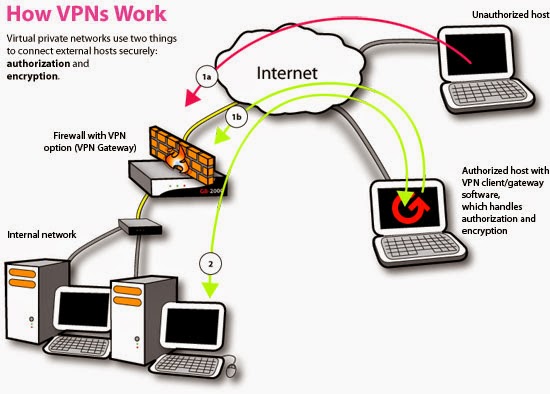What is a virtual private network (VPN)?
A virtual private network (VPN) is a network that uses a public telecommunication infrastructure, such as the Internet, to provide remote offices or individual users with secure access to their organization's network. A virtual private network can be contrasted with an expensive system of owned or leased lines that can only be used by one organization. The goal of a VPN is to provide the organization with the same capabilities, but at a much lower cost.
A VPN works by using the shared public infrastructure while maintaining privacy through security procedures and tunneling protocols such as the Layer Two Tunneling Protocol (L2TP). In effect, the protocols, by encrypting data at the sending end and decrypting it at the receiving end, send the data through a "tunnel" that cannot be "entered" by data that is not properly encrypted. An additional level of security involves encrypting not only the data, but also the originating and receiving network addresses.
Advantages & Disadvantages
A VPN is a inexpensive effective way of building a private network. The use of the Internet as the main communications channel between sites is a cost effective alternative to expensive leased private lines. The costs to a corporation include the network authentication hardware and software used to authenticate users and any additional mechanisms such as authentication tokens or other secure devices. The relative ease, speed, and flexibility of VPN provisioning in comparison to leased lines makes VPNs an ideal choice for corporations who require flexibility. For example, a company can adjust the number of sites in the VPN according to changing requirements.
There are several potential disadvantages with VPN use. The lack of Quality of Service (QoS) management over the Internet can cause packet loss and other performance issues. Adverse network conditions that occur outside of the private network is beyond the control of the VPN administrator. For this reason, many large corporations pay for the use of trusted VPNs that use a private network to guarantee QoS. Vendor interoperability is another potential disadvantage as VPN technologies from one vendor may not be compatible with VPN technologies from another vendor. Neither of these disadvantages have prevented the widespread acceptance and deployment of VPN technology.
A virtual private network (VPN) is a network that uses a public telecommunication infrastructure, such as the Internet, to provide remote offices or individual users with secure access to their organization's network. A virtual private network can be contrasted with an expensive system of owned or leased lines that can only be used by one organization. The goal of a VPN is to provide the organization with the same capabilities, but at a much lower cost.
A VPN works by using the shared public infrastructure while maintaining privacy through security procedures and tunneling protocols such as the Layer Two Tunneling Protocol (L2TP). In effect, the protocols, by encrypting data at the sending end and decrypting it at the receiving end, send the data through a "tunnel" that cannot be "entered" by data that is not properly encrypted. An additional level of security involves encrypting not only the data, but also the originating and receiving network addresses.
Advantages & Disadvantages
A VPN is a inexpensive effective way of building a private network. The use of the Internet as the main communications channel between sites is a cost effective alternative to expensive leased private lines. The costs to a corporation include the network authentication hardware and software used to authenticate users and any additional mechanisms such as authentication tokens or other secure devices. The relative ease, speed, and flexibility of VPN provisioning in comparison to leased lines makes VPNs an ideal choice for corporations who require flexibility. For example, a company can adjust the number of sites in the VPN according to changing requirements.
There are several potential disadvantages with VPN use. The lack of Quality of Service (QoS) management over the Internet can cause packet loss and other performance issues. Adverse network conditions that occur outside of the private network is beyond the control of the VPN administrator. For this reason, many large corporations pay for the use of trusted VPNs that use a private network to guarantee QoS. Vendor interoperability is another potential disadvantage as VPN technologies from one vendor may not be compatible with VPN technologies from another vendor. Neither of these disadvantages have prevented the widespread acceptance and deployment of VPN technology.

No comments:
Post a Comment
its cool